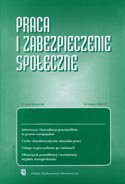The subject of the gloss is the judgment of the Provincial Administrative Court in Wrocław of March 20, 2022, IV SA/Wr 611/21. On its basis, the court upheld the decision of the staroste refusing to confer the degree of appointed teacher on the complainant, considering that the period of doctoral studies should not be counted towards her internship. As part of the analysis, a critical assessment was made of the interpretation of Art. 279 sec. 3 of the Act of July 3, 2018 – Provisions introducing the Act – Law on Higher Education and Science, i.e. the provision on the basis of which the period of doctoral studies is included in the period of work on which employee rights depend. As part of this, the elements characterizing the status of a doctoral student were presented. It was explained – contrary to the court's position – that this status is not exhausted by educational elements. In the following part, the meaning of the term employee rights is explained. At the same time, reference was made to the meaning given to this term by Art. 174 § 2 LC Finally, pointing to the ratio legis of Art. 279 sec. 3, it was concluded that the period of doctoral studies belongs to the group of the so-called credited (credit) periods. Based on the above, it was found that the refusal approved by the administrative court to count the above period towards the period of experience required to obtain promotion to the rank of appointed teacher was clearly erroneous in its essence.
Keywords: PhD student; academic degree; employee rights; work experience; doctoral studies

